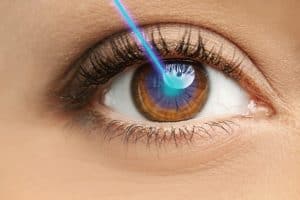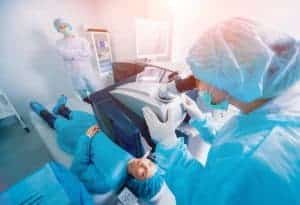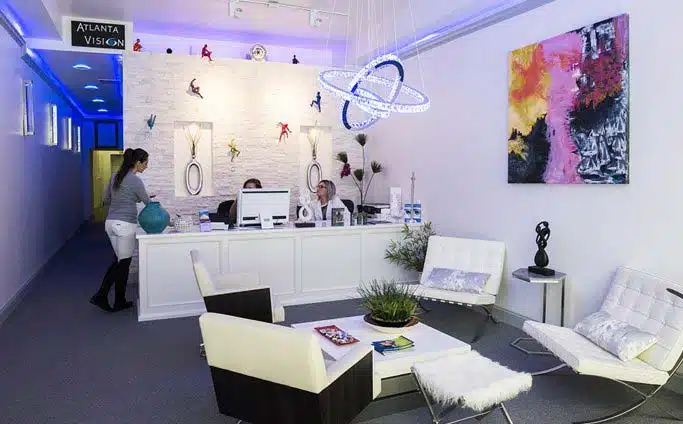Also Offering PRK for Dunwoody & Johns Creek
At Atlanta Vision Institute, we’re proud to offer the most advanced eye surgeries to date, so that no matter your eye care needs, we can help. Our leading team of eye surgeons can help you see clearly again, and we’re prepared to answer all your questions in order to give you the best options available. Dr. Ashraf and his team have performed over 50,000 eye surgery procedures, offering extensive experience and industry-leading skills to put your mind at ease when choosing Atlanta Vision Institute.
What is PRK (Photorefractive Keratectomy)?
While LASIK is the most popular type of laser eye surgery performed today, it’s not right for everyone. If you’re not a good candidate for LASIK, PRK may be an effective alternative that will help you restore clear, sharp vision.
PRK (photorefractive keratectomy) is a procedure in which laser energy is used to reshape corneal tissue, allowing light to properly focus on the retina (the light-sensitive tissue lining the back of the eye) and thus correct vision. A cornea that is not ideally shaped will cause blurry vision at varying distances.
What is the Difference Between PRK & LASIK
The difference between LASIK and PRK is that with LASIK a corneal flap is created and the laser is applied to the inner tissue of the cornea. With PRK, the epithelium (the outer layer of “skin” of the cornea) is removed and a laser is applied to the surface of the cornea. PRK can be used to correct low to high hyperopia (nearsightedness), myopia (farsightedness) and astigmatism (having an irregularly- or oval-shaped cornea rather than one that is round). As is true with LASIK, the entire PRK procedure takes only a few minutes to perform.
Why Choose PRK Over LASIK?
PRK may also be the best choice for individuals who lead very active lifestyles or work in high-risk fields such as law enforcement, aviation or the military, any of which carries a greater risk of eye injury. Because a corneal flap is not made during the PRK procedure, there is less of a chance of injury after this treatment should something come into contact with the eye.
The best way to determine whether PRK is the best type of laser vision correction for you is to visit our office for a comprehensive eye evaluation with Dr. Ashraf. This will allow you the time to have your questions answered and learn more about our PRK technology, experience, and results.
PRK Results & Recovery
Vision is greatly improved but typically blurry immediately after the procedure (20/80-20/200). It generally starts to get better once the surface layer of the cornea (epithelium) has grown back, which in most cases takes 3 to 4 days (approximately 20/40). Vision typically starts to become good within 7 to 10 days (usually 75-85 percent improvement), and typically continues to improve for the next several weeks. The healing process varies for each patient, and it is difficult to precisely predict when particular people will achieve their best visual acuity. However, most patients who have both eyes treated at the same time report they are able to drive a car safely and resume their normal activities with 3 to 5 days following PRK.
PRK FAQs
Does PRK Hurt?

How Long Does PRK Take to Perform?
While you may spend one to two hours or longer at Atlanta Vision Institute on the day of your PRK procedure, the actual laser eye surgery takes around 20 minutes to improve vision in both eyes.
Am I a Good Candidate for PRK?
Patients interested in refractive eye surgery may be better candidates for PRK than LASIK if they have thin corneas that increase LASIK flap complications or existing dry eye disease. The LASIK flap can worsen dry eye symptoms. Depending on your profession, PRK may be the better option for you. For example, PRK is often the better choice for athletes who play contact sports, including football and basketball.
You must meet several criteria for laser vision correction with PRK, such as:
- You have a stable vision prescription that hasn’t changed for one to two years.
- Your eyes are healthy and free from common diseases and conditions, including glaucoma, cataracts, diabetic eye disease and infection.
- You are not pregnant, breastfeeding or trying to conceive.
- You don’t have an autoimmune disease or other medical condition that could interfere with healing after PRK.
Dr. Ashraf can determine if PRK is right for you during a comprehensive eye exam at Atlanta Vision Institute.
What Happens on the Day of PRK Treatment?

Dr. Ashraf will use the computer-guided laser to remove your cornea’s epithelium or outer corneal layer and reshape the curvature for better vision. A soft contact-like bandage protects the eyes during your recovery while the surface layer regrows. Our eye surgeon will place ointment or eye drops in your eyes to prevent infection and discomfort, and you may be asked to rest a little before going home with clear post-op instructions and a schedule of follow-up appointments.
Follow-up appointments typically consist of one appointment the day after PRK, another one several days later to remove the bandage contact lens, followed by a series of visits to check vision, eye pressure and dryness and determine if enhancement is needed. Follow-ups may continue through the first year after PRK, after which you can have regular eye exams annually.
Are My PRK Results Permanent?
PRK results are permanent in the sense that the curvature of your corneas is corrected for good. However, your eyes change as a natural part of aging, and PRK won’t prevent you from needing reading glasses in your 40s or later due to the age-related loss of near vision (presbyopia) caused by the hardening of your eye’s natural lens.
Women may experience temporary vision changes during pregnancy and menopause due to hormonal changes. It’s essential to continue with comprehensive eye exams to maintain healthy eyes and make sure that eye diseases that may interfere with your eyesight are detected early.
If you’re tired of wearing prescription eyeglasses and contact lenses, contact Atlanta Vision Institute to learn more about your laser eye surgery options.

Please Take Our LASIK or Cataract Surgery Quiz
Take our vision quiz to find out if you qualify for LASIK or cataract surgery!


